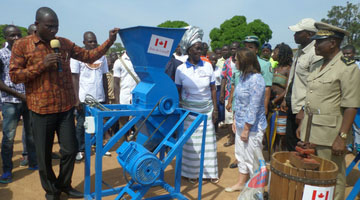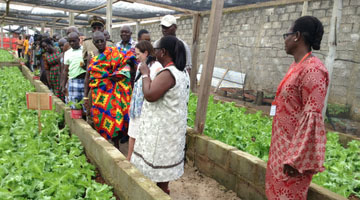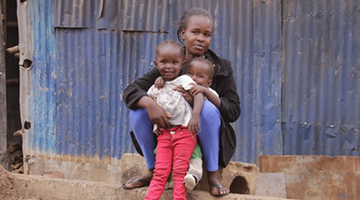It takes a village: Addressing child, early and forced marriage in Côte d’Ivoire
Canada in Côte d’Ivoire
Child, early and forced marriage
October 2018
Community participation is essential to end child, early and forced marriage.
For the community of Bondoukou, a town in eastern Côte d’Ivoire, discussing child, early and forced marriage was taboo. Even those who did not approve stayed silent.
To break down the social barriers surrounding this issue, the Embassy of Canada to Côte d’Ivoire partnered with the Réseau Ivorien pour la Défense des Droits de l’Enfant et de la Femme (RIDDEF), a local non-governmental organization committed to the rights of women and girls, to host a series of educational events for girls and their communities.
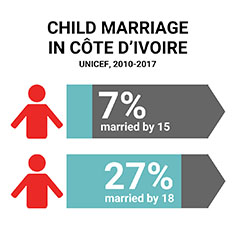 According to UNICEF, 7% of girls are married by the age of 15 and 27% of girls are married by the age of 18 in Côte d’Ivoire.
According to UNICEF, 7% of girls are married by the age of 15 and 27% of girls are married by the age of 18 in Côte d’Ivoire. Challenging accepted beliefs
It is estimated that 27% of girls are married by the age of 18 in Côte d’Ivoire. Ending this requires a major shift in attitudes and beliefs. This must be supported with extensive educational and community outreach programs.
Sexual education campaigns were delivered in 20 schools reaching 6,000 students. It also established a twinning program pairing older and younger girls together to facilitate sensitive conversations.
Community collaboration
The project mobilized community members, religious leaders, teachers and parents to shed light on the issues and challenge attitudes and beliefs.
Community members raised the concern that for many women in the region speaking out against child, early and forced marriage can be isolating. They risk being judged by the community as women who do “not respect tradition.”
“I thought only of myself, of my own honour,” said a father, “I wanted to prevent my daughter from becoming pregnant before she was married.”
One of the local traditional leaders, Chief Nanan Abou Bibi II, committed to championing change by promising to “ask religious leaders to preach in mosques about the consequences of this practice and ask families to end the practice.”
“Child marriage is not part of our traditions,” said the Chief, “There is no justification for it.”
Better for everyone
In addition to violating human rights, this practice prevents their full participation in economic, social and political spheres and therefore hinders the development of their countries. Ending this practice will help girls, communities and countries prosper.
While meeting with the community, Canadian Ambassador to Côte d’Ivoire, Julie Shouldice, encouraged men, women and children to join forces and work towards equality.

"Canada supports the initiative with RIDDEF on this issue because of the scale of the phenomenon and its harmful consequences, not only on the life and future of girls in Côte d’Ivoire but also on the development of families and communities.” – Canadian Ambassador to Côte d’Ivoire Julie Shouldice
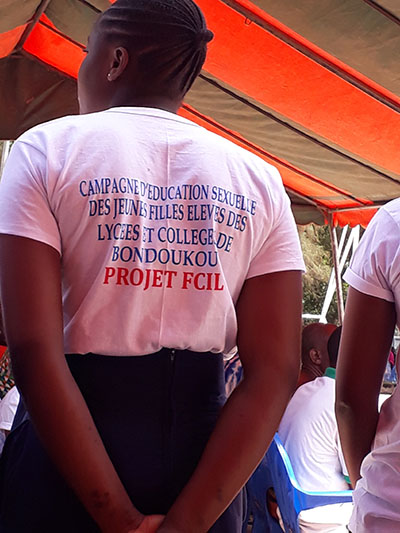 The Embassy of Canada to Côte d’Ivoire has provided over $160,000 to local projects focused on ending child, early and forced marriage.
The Embassy of Canada to Côte d’Ivoire has provided over $160,000 to local projects focused on ending child, early and forced marriage.Committed to change
At the national level, the Ambassador and Embassy officials have raised the issue with the Government of Côte d’Ivoire. The Government recognizes the importance of ending child, early and forced marriage and is working to alter the legal framework and promote changes in societal norms.
Over the past five years, the Embassy has provided over $160,000 to local projects focused on ending child, early and forced marriage in Côte d’Ivoire. The Canada Fund for Local Initiatives (CFLI) provides funding for small projects developed and implemented by local organizations in developing countries around the world; by responding directly to local needs, modest contributions create a big impact.
Canada remains committed to end child, early and forced marriage worldwide. Since 2013, Canada has announced over $80 million in new targeted programming to end the practice.
Hope for the future
As an additional preventive measure in Bondoukou, Canada and RIDDEF helped set up 20 early warning committees in schools, mosques and neighbourhoods.
A young student explained that the committees “will allow us to condemn the practice of early and unwanted marriage of girls in Bondoukou.”
With these and other measures in place, the community of Bondoukou is hopeful they will soon be free of child marriage.
Related links
External resources
- Date modified:
![12-year-old Rosie Makore and 13-year-old Neema Chacha at the Zanzibar International Film Festival. [Photo: Samson Kapinga]](https://international.gc.ca/world-monde/stories-histoires/assets/images/2018/cdi-photo-top.jpg)
